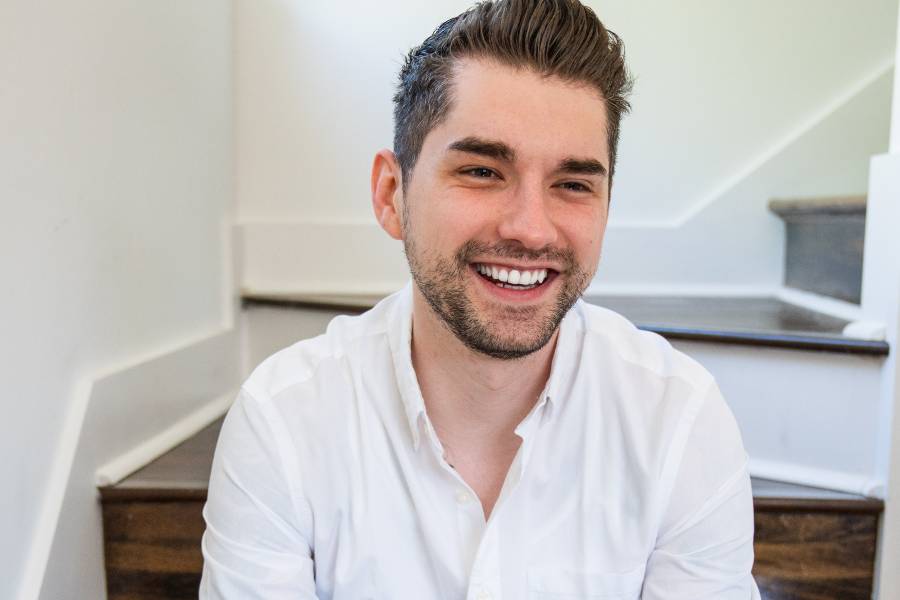Pavlovic first Lipscomb student to receive Tennessee Behavioral Health Scholarship
From Sarajevo to Nashville, Pavlovic's journey leads him to a career helping others.
Kim Chaudoin |

Ryan Pavlovic has been fascinated by psychology for as long as he can remember.
As a graduate student in Lipscomb University's Clinical Mental Health Counseling addictions specialization program, he is pursuing a career that his life’s journey has been leading him to for more than 30 years. This spring Pavlovic accomplished another milestone on this journey as he was named Lipscomb’s first recipient of the new Tennessee Pathways Behavioral Health Scholarship (TPBHS).
The Tennessee Pathways Behavioral Health Scholarship was established in 2023 by the state of Tennessee to address the growing demand for more behavioral health professionals. The scholarship program is jointly administered by the Tennessee Association of Mental Health Organizations (TAMHO) and the Tennessee Association of Alcohol, Drug & other Addiction Services (TAADAS).
“It’s an incredible honor to receive this scholarship, and to be part of the inaugural class receiving it,” says Pavlovic. “I hope this scholarship will inspire others to get into this field of work. Davidson County has the second highest overdose death rate in the U.S. (between February 2022 and January 2023) and we need more clinicians. Changing the addiction culture of the state I am proud to live in can come from opportunities like this scholarship.”
In exchange for tuition assistance, scholarship recipients will commit to working at a state-funded community behavioral health agency that serves Tennesseans with the greatest needs and the least ability to pay.
“We were thrilled to learn that Ryan was selected as a scholarship recipient. Based on the rising numbers of overdose rates and data reflecting substance use disorder trends, our field needs more mental health counselors who have in-depth knowledge and training in the specialty area of substance use disorder treatment,” says Professor DeAndrea N. Witherspoon Nash, director of the Clinical Mental Health Counseling Program and lead faculty, addiction specialization.
Pavlovic is completing his clinical experience as part of his graduate studies at Cumberland Heights, which has been a community partner with Lipscomb for many years
“My clinical experience at Cumberland Heights centers on conducting individual psychotherapy, running an Intensive Outpatient Group, consulting on treatment plans and doing a lot of reading, researching and preparing,” explains Pavlovic. “It has been a great experience and opportunity.”
“I greatly appreciate my clinical supervisor, Lisa Corbin, for everything she does for me and for our community,” he continues. “She is the embodiment of a fearless and charismatic leader in this field of work. I have seen healing in real-time with the work she does.”
Pavlovic’s journey began in Sarajevo, the capital of Bosnia and Herzegovina, where he was born in 1992 just as the Bosnian War and the siege of his hometown was beginning. When he was four years old he and his family came to the United States as refugees and he grew up in Vancouver, Washington.
I’m surrounded by professors who love what they do and take the time to welcome diversity and culture alongside the sciences. — Ryan Pavlovic
He attended the University of Washington where he received an undergraduate degree in communication and a minor in music. After graduation, he dedicated his time and energy to being a successful musician as a full-time studio drummer while also touring with various artists.
But Pavlovic’s early interest in psychology continued to tug at him.
“In my spare time, I would listen to OpenCourseWare YouTube lectures and insights from psych legends such as Paul Bloom, Nancy Kanwisher, John Gabrieli, Robert Sapolsky, Wendy Suzuki, Andre Szameitat and Jordan Peterson,” he explains. “After a music career throughout my 20s, I wanted to dive deeper and learn how to apply my passion for psychology constructively to those in need.”
“Life is incredibly serendipitous and this field came to me as much as I came to it,” he says. He chose to pursue a graduate degree in the field of addiction specialization counseling to, “strive to empower individuals to holistically and creatively rebel against their own brain.” “By far the most punk rock thing I could do,” quips Pavlovic.
At Lipscomb, Pavlovic found a university where he felt a sense of belonging and where he is flourishing.
“Coming from a large undergraduate program into a smaller private institution has radically changed my perspective on education and what works for me as a student,” he says. “I’m surrounded by professors who love what they do and take the time to welcome diversity and culture alongside the sciences. I am able to form friendships with my professors and think of them as mentors and future colleagues.”
This summer, Pavolic will complete his Master of Science degree at Lipscomb. But he is keeping reaching this milestone on his journey in perspective. “Music has taught me that I am forever a student and psychology, much like music, carries that same idea,” he explains. “I am keeping my head down, celebrating the win and looking forward to continuously growing by learning from my patients.”
Upon completing his degree, Pavlovic plans to secure a position in the field.
“From there,” he concludes, “I’ll be taking some time to start a family, get a dog, and travel the world, and of course – make some music with my friends.”
Learn more about Lipscomb's Clinical Mental Health Counseling addictions specialization program.